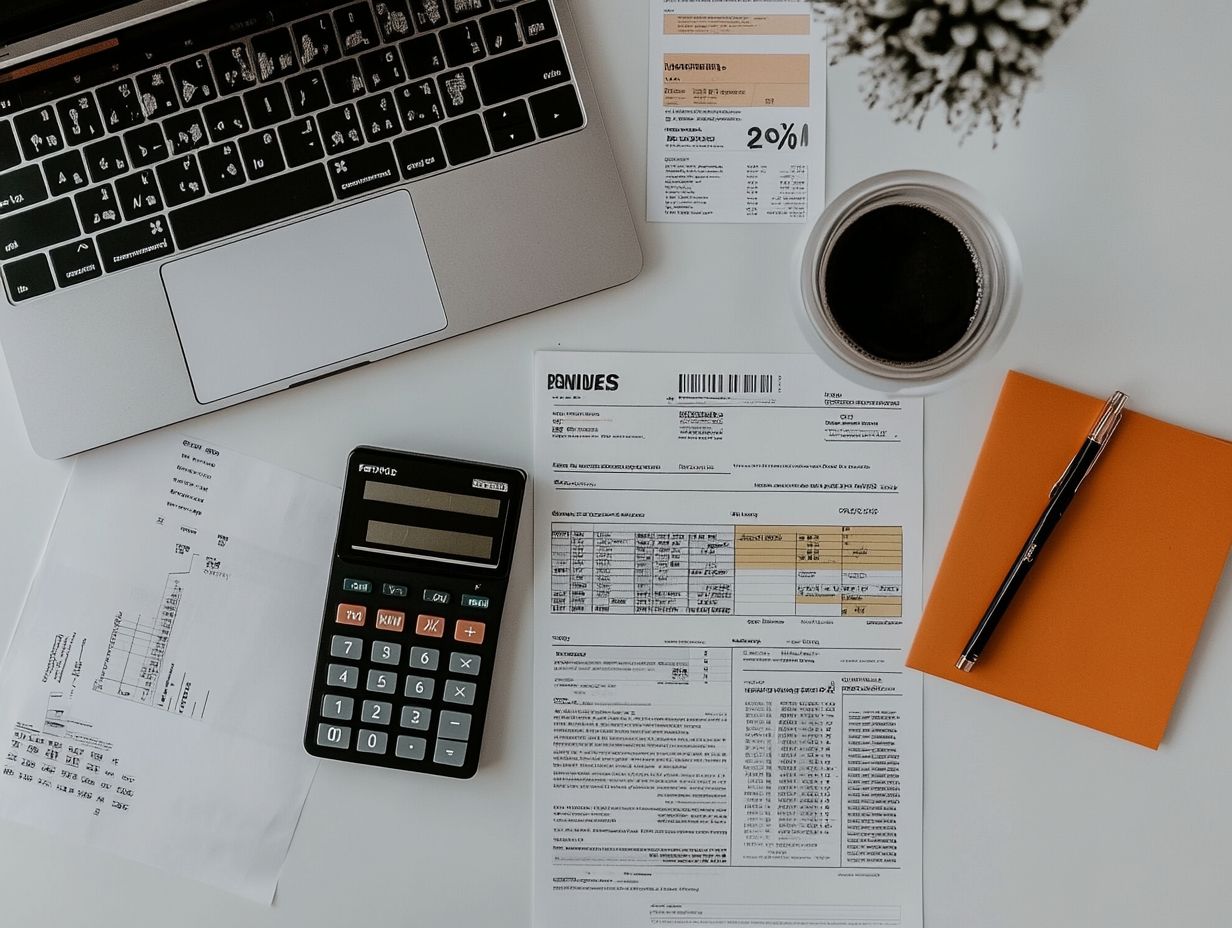What Every Freelancer Should Know About Taxes
Freelancing grants you a remarkable level of flexibility and independence, yet it brings along a set of unique tax responsibilities that can feel quite daunting.
Grasping your tax obligations is essential for maintaining compliance and optimizing your earnings. This article provides a comprehensive overview of the various taxes freelancers need to keep an eye on, outlines crucial filing deadlines, and uncovers common deductions that can ease your financial burden.
You ll also discover essential bookkeeping tips and the advantages of collaborating with a tax professional to simplify your financial management. Whether you re a seasoned freelancer or just embarking on your journey, these insights will empower you to navigate the often intricate landscape of taxes with confidence.
Contents
- Key Takeaways:
- Understanding Tax Obligations for Freelancers
- Common Deductions for Freelancers
- Keeping Track of Finances as a Freelancer
- Tax Planning Tips for Freelancers
- Working with a Tax Professional
- Frequently Asked Questions
- What is considered freelancing?
- Do I have to pay taxes as a freelancer?
- What taxes do I need to pay as a freelancer, including LLC and S corporation considerations?
- How do I calculate and pay my taxes as a freelancer, including using Schedule C and Form 1099?
- Are there any deductions or credits available for freelancers, such as tax deductions for business expenses?
- Is it necessary to hire an accountant or tax professional, such as a CPA, as a freelancer?
Key Takeaways:

- Freelancers are responsible for paying various types of taxes, including income, self-employment, and estimated taxes.
- Don t miss out on money-saving deductions! Keep track of your deductible expenses such as office supplies, travel costs, and health insurance to lower your tax liability.
- Good bookkeeping and record-keeping is essential for accurate tax filing and maximizing deductions. Consider working with a tax professional for guidance and assistance.
Understanding Tax Obligations for Freelancers
Understanding your tax obligations is essential for ensuring compliance and optimizing your financial performance as a freelancer. As an independent business owner, you encounter unique tax challenges, including the need to file self-employment tax, income tax, and manage quarterly taxes.
The IRS offers guidelines outlining the requirements for filing your tax return, which include using forms like Schedule C (a form used to report income or loss from a business you operated) and 1099. Getting to know these forms is crucial to crafting a robust financial strategy that supports your freelance endeavors.
Different Types of Taxes to Consider
As a freelancer, you must navigate various types of taxes that can significantly impact your business operations, including self-employment tax and the income tax obligations imposed by the IRS. Understanding these taxes is crucial for your financial planning and sustainability.
Self-employment tax, which supports Social Security and Medicare, currently stands at 15.3%. This can take a substantial bite out of your earnings; for instance, if you earn $50,000, nearly $7,650 could go toward this tax alone. Federal income tax rates span from 10% to 37%, further affecting your take-home pay. To better navigate these challenges, check out tax tips for freelancers in the gig economy. Depending on where you reside, you may also encounter state-level taxes, which vary widely across the U.S., adding yet another layer to the complex tax landscape.
With freelancers making up about 36% of the U.S. workforce, as reported by Statista, being aware of these tax implications is essential to protect your income and ensure compliance.
Tax Filing Deadlines for Freelancers
Meeting tax filing deadlines is crucial for freelancers like you to avoid penalties and stay compliant with IRS regulations regarding quarterly taxes and annual tax returns.
These important deadlines require you to make quarterly estimated tax payments by the 15th of April, June, September, and January of the following year. If you operate on a calendar year, your annual tax return must be submitted by April 15.
Missing these deadlines can lead to significant penalties, including interest on unpaid taxes and late fees that can accumulate rapidly.
To keep yourself organized and ahead of the curve, consider employing various strategies, such as:
- Using tax software
- Maintaining meticulous records of your income and expenses
- Setting reminders for each deadline
By proactively managing your tax obligations, you can minimize stress and concentrate on what truly matters: growing your business.
Common Deductions for Freelancers

As a freelancer, you have the unique opportunity to significantly reduce your taxable income by mastering the various deductions at your disposal. Understanding these deductions is essential for maximizing your financial outcomes and truly optimizing your status as a business owner.
Expenses That Can Be Deducted
Identifying and understanding the types of expenses you can deduct is essential for freelance professionals looking to reduce their overall tax burden.
Taking the time to familiarize yourself with various deductible expenses can lead to substantial savings. This includes everything from essential software subscriptions for project management and design work to office supplies like pens, paper, and other materials critical for your business operations.
Don’t overlook professional fees; these can include services from accountants or consultants that enhance your business acumen. By incorporating sound accounting practices and diligent record-keeping, you can maximize these deductions while staying compliant with tax regulations. To further ensure you’re on the right track, be aware of the top tax mistakes freelancers make. This allows you to focus more on your creative pursuits.
Keeping Track of Finances as a Freelancer
Effective financial management is your key to success as a freelancer! It enables you to track your income, manage your expenses, and build good relationships with clients and tax authorities.
By mastering these skills, you can ensure a seamless and successful freelance journey.
Best Practices for Bookkeeping and Record-Keeping
Implementing best practices for bookkeeping and record-keeping is crucial for maintaining your financial health and ensuring tax compliance as a freelancer.
Follow these best practices to avoid missing important income and expenses. This will help you stay stress-free during tax season!
Using accounting software like Xero helps manage your finances easily. It allows you to effortlessly track invoices, expenses, and profit margins.
Seeking guidance from a Certified Public Accountant (CPA) is invaluable; their expertise will help you navigate complex tax regulations, optimize your deductions, and ensure you re fully capitalizing on the tax benefits available to you.
Staying organized and keeping thorough records not only simplifies your tax preparation but also provides insights for better financial decision-making. For freelancers, maximizing deductions can ultimately pave the way for long-term success in your freelance career.
Tax Planning Tips for Freelancers

Strategic tax planning is crucial for freelancers like you, as it enables the minimization of tax liability while maximizing deductions. This thoughtful approach ultimately enhances your financial performance, setting you on a path to greater success.
Minimizing Tax Liability and Maximizing Deductions
As a freelancer, you can take proactive steps to minimize your tax liability while maximizing the deductions available to you.
Understanding the importance of making estimated tax payments throughout the year is crucial; it can help you avoid those hefty penalties that often come with underpayment when tax time rolls around. By investing in tax-deductible expenses like your home office costs, professional development courses, and equipment purchases, you can significantly lower your taxable income. For a deeper insight, check out understanding self-employment taxes, which covers what you need to know.
It s also wise to engage with a Certified Public Accountant (CPA) who can provide tailored strategies based on your unique business structure, whether you re operating as an LLC or an S Corporation.
Working with a Tax Professional
Collaborating with a tax professional can truly be a game-changer for you as a freelancer. Their expertise can unlock significant financial benefits while ensuring you stay compliant with tax regulations.
Benefits and Considerations
Understanding the benefits and considerations of collaborating with a tax professional can enable you to make informed decisions about your financial management.
By engaging the expertise of a CPA or tax advisor, you gain access to personalized advice tailored to your unique financial situation. This ensures that your tax returns are not only accurate but also efficient for maximum savings.
These professionals are well-versed in the details of freelance income and are adept at identifying potential deductions and credits that you might otherwise overlook.
While there may be costs associated with hiring such experts, the investment typically pays off in the form of reduced tax liabilities and enhanced peace of mind. Finding the right expert is crucial for your success!
Frequently Asked Questions

What is considered freelancing?
Freelancing is a work arrangement where individuals offer their services to clients on a project basis rather than being employed by a company or organization.
Do I have to pay taxes as a freelancer?
Yes, freelancers are considered self-employed and are required to pay taxes on their income, which includes federal and state income taxes, as well as self-employment taxes.
What taxes do I need to pay as a freelancer, including LLC and S corporation considerations?
Freelancers are responsible for federal and state income taxes, as well as self-employment taxes that cover Social Security and Medicare. They may also need to pay state and local business taxes.
How do I calculate and pay my taxes as a freelancer, including using Schedule C and Form 1099?
Freelancers can use their income and expenses to calculate taxes using tax forms such as Schedule C or Form 1099. They can then pay taxes quarterly through estimated tax payments or annually when filing their tax return.
Are there any deductions or credits available for freelancers, such as tax deductions for business expenses?
Yes, freelancers can deduct business expenses like office supplies, travel expenses, and health insurance premiums. They may also qualify for tax credits such as the home office deduction or the self-employed health insurance deduction.
Is it necessary to hire an accountant or tax professional, such as a CPA, as a freelancer?
While not required, it can be beneficial for freelancers to hire an accountant or tax professional to help navigate the complexities of self-employment taxes and maximize deductions. They can also assist with filing tax returns and keeping accurate records.
Ready to take control of your taxes? Contact a tax professional today!






